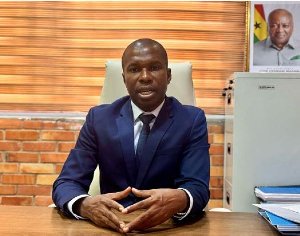Bail conditions involving landed property are drawing increased scrutiny in Ghana, following insights from Professor Stephen Kwaku Asare, a legal expert and Democracy and Development Fellow at CDD-Ghana.
According to him, the use of real estate as a requirement for bail in corruption-related investigations is more than a formality—it is a legal tactic designed to manage risk, enhance transparency, and serve as a practical tool for truth testing.
Prof. Asare, known for his governance advocacy, emphasized that when suspects are required to produce landed property in their own names, the measure functions as both a compliance mechanism and a truth-revealing strategy.
The approach aims to tie accountability directly to the accused rather than shifting the burden to associates or third parties.
“Flushes Out Asset Truths: This requirement forces suspects to either disclose hidden or undeclared landed assets or admit they own nothing, which raises questions about how they lived, travelled, and governed. The logic is ‘if a person who chaired a state enterprise owns no land, we need to ask why.’”
Professor Stephen Kwaku Asare

According to Prof. Asare, this approach not only tests the truthfulness of the suspect but can also expose gaps between lifestyle and declared assets.
Investigators often have intelligence indicating that a suspect owns property. In such cases, asking for real estate to be used as bail puts the accused in a difficult position: either they admit ownership and comply, or they remain silent, which triggers suspicion.
The technique, therefore, provides a way to uncover potential concealment of wealth without immediately going through complex asset seizure procedures.
Legal Tool With Political Risks
Prof. Kwaku Asare further argued that by making the accused stake their own assets, the process avoids “bail shopping,” where politically connected individuals enlist friends or family members to post surety on their behalf.
It also reduces the influence of proxies who might otherwise protect the suspect from meaningful accountability.
Prof. Asare underscored that such tactics help investigators keep the process clean, focused, and rooted in the local jurisdiction.
Landed property also has a physical and symbolic role. Unlike movable assets such as vehicles or cash, real estate cannot easily be transferred or hidden.
“Locks in Local Jurisdiction: Landed property roots the accused in the jurisdiction. It is immovable, traceable, and easily attachable in case of default. The logic is ‘you can sell a car or transfer cash abroad, but you can’t smuggle a house.’”
Professor Stephen Kwaku Asare

He noted that it ties the suspect to the investigation both literally and legally, increasing the likelihood that they will remain within reach of the courts.
The high value and immovable nature of land also signal the seriousness of the charges—particularly in cases involving alleged theft of public funds or abuse of office.
He noted that these tactics send a clear message that investigators are treating the issue with gravity, which is crucial for building public trust.
The rationale is that corruption investigations must not only be done properly but also be seen to be done with integrity and rigor.
Potential For Misuse, Legal Challenges of Landed Property Bail Condition
However, while the strategy has its strengths, Prof. Asare was quick to highlight the significant risks and limitations associated with its use.
Accordingly, he cautioned that not every suspect genuinely owns land. Imposing such a bail requirement on individuals without property could lead to prolonged detention, potentially converting a pre-trial process into a de facto punishment.
In his words, the justice system must not become a mechanism for holding people indefinitely on technical grounds.
“[It] can be perceived as punitive or political: Especially in high-profile cases, such terms can attract accusations of bias, vendetta, or selective justice, particularly if the accused is a known public figure or media personality. The logic is ‘we risk criticism that bail is being used as a pressure tactic, not a neutral safeguard.’”
Professor Stephen Kwaku Asare
Additionally, Prof. Asare explained that the measure may not always work as intended. Sophisticated suspects might have already transferred their assets to shell companies or relatives.
In such scenarios, requiring property in their name becomes ineffective in exposing the true trail of corruption. The legal instrument thus loses its potency against well-prepared individuals skilled in hiding wealth.

Furthermore, if bail conditions are seen as disproportionate, they can be challenged in court. Judges may find the requirements excessive, especially when charges are not yet formally filed or if the evidence remains inconclusive.
A successful challenge could not only derail the investigation but also cast doubt on the impartiality of the justice system.
Prof. Asare also raised concerns about the shifting tides of public perception. In today’s polarized media environment, what begins as a legitimate investigative tactic may gradually be portrayed as harassment or political persecution.
Over time, the detained suspect might even win public sympathy, especially if the process drags on or appears overly harsh.
Despite these potential drawbacks, Prof. Asare emphasized that requiring landed property remains a powerful tool—if wielded judiciously.
It can help investigators establish asset ownership, deter flight risk, and affirm the seriousness of the charges. But it must be used in ways that uphold due process and protect against accusations of selective justice or unconstitutional detention.
Accordingly, he asserted that the ultimate objective is not to punish suspects before trial, “but to ensure that when the time comes, justice is within reach and backed by real leverage.”
A well-balanced bail policy, in his view, reinforces the rule of law and enhances public confidence in the judicial process, especially when it comes to fighting high-level corruption.
READ ALSO: Record Channel Crossings Spark UK Migration Alarm























